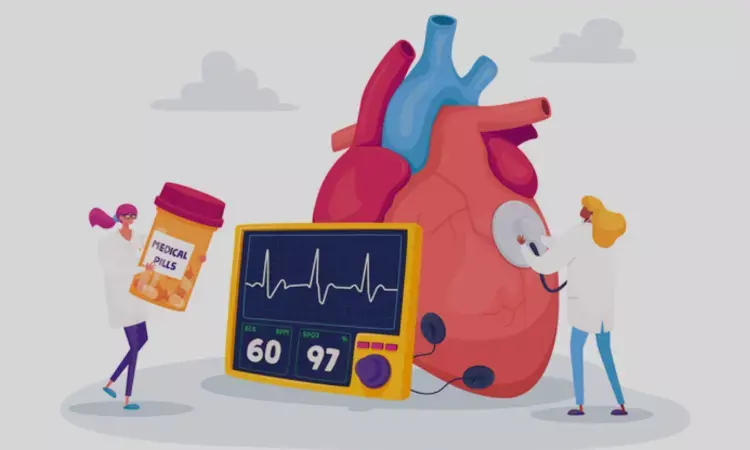- Home
- Medical news & Guidelines
- Anesthesiology
- Cardiology and CTVS
- Critical Care
- Dentistry
- Dermatology
- Diabetes and Endocrinology
- ENT
- Gastroenterology
- Medicine
- Nephrology
- Neurology
- Obstretics-Gynaecology
- Oncology
- Ophthalmology
- Orthopaedics
- Pediatrics-Neonatology
- Psychiatry
- Pulmonology
- Radiology
- Surgery
- Urology
- Laboratory Medicine
- Diet
- Nursing
- Paramedical
- Physiotherapy
- Health news
- Fact Check
- Bone Health Fact Check
- Brain Health Fact Check
- Cancer Related Fact Check
- Child Care Fact Check
- Dental and oral health fact check
- Diabetes and metabolic health fact check
- Diet and Nutrition Fact Check
- Eye and ENT Care Fact Check
- Fitness fact check
- Gut health fact check
- Heart health fact check
- Kidney health fact check
- Medical education fact check
- Men's health fact check
- Respiratory fact check
- Skin and hair care fact check
- Vaccine and Immunization fact check
- Women's health fact check
- AYUSH
- State News
- Andaman and Nicobar Islands
- Andhra Pradesh
- Arunachal Pradesh
- Assam
- Bihar
- Chandigarh
- Chattisgarh
- Dadra and Nagar Haveli
- Daman and Diu
- Delhi
- Goa
- Gujarat
- Haryana
- Himachal Pradesh
- Jammu & Kashmir
- Jharkhand
- Karnataka
- Kerala
- Ladakh
- Lakshadweep
- Madhya Pradesh
- Maharashtra
- Manipur
- Meghalaya
- Mizoram
- Nagaland
- Odisha
- Puducherry
- Punjab
- Rajasthan
- Sikkim
- Tamil Nadu
- Telangana
- Tripura
- Uttar Pradesh
- Uttrakhand
- West Bengal
- Medical Education
- Industry
Curcumin exhibits Cardioprotective Potential Against Diabetic Cardiomyopathies, Reveals Comprehensive Study

China: In a groundbreaking systematic review and meta-analysis, researchers have unveiled compelling evidence of the cardioprotective properties of curcumin against diabetic cardiomyopathies. Published in Phytomedicine journal, this study consolidates preclinical research findings, shedding light on curcumin's therapeutic potential in managing cardiovascular complications associated with diabetes.
The study found that curcumin may exert cardioprotective effects in diabetic cardiomyopathy (DCM) through its anti-inflammatory, antioxidant, anti-apoptotic, and autophagy-enhancing effects. The protective effect of curcumin was found to be proportional to the dose, and the efficacy may be increased further at a concentration of above 200 mg/kg, and there is a need for further validation.
Diabetic cardiomyopathy (DCM) is a common complication of diabetes that often leads to further damage to the heart muscle. Curcumin has been proven to have various cardioprotective effects, however, no systematic review has been conducted on the protective effect against DCM.
Against the above background, Wujiao Wang, University of Chinese Medicine, Beijing, China, and colleagues aimed to analyze the preclinical (animal model) evidence of curcumin's therapeutic effects in DCM.
For this purpose, the researchers searched eight databases and two registry systems from the time of library construction to 1 November 2023. Rigorous data extraction and quality assessment was performed. Using the SYRCLE RoB tool, the methodological quality of the included studies was appraised. Statistical analyses were carried out using RevMan 5.4 software, and Egger's test and Funnel plots were performed using Stata 17.0 software to assess publication bias. This study included 32 trials with 681 animals.
Meta-analysis showed that curcumin significantly improved cardiac function indices (LVFS, LVEF, and LVSd), decreased markers of myocardial injury, HW/BW ratio, and randomized blood glucose compared to the control group, in addition to showing beneficial effects on mechanistic indices of inflammation, myocardial oxidation, apoptosis, and autophagy.
“Our study is the first meta-analysis of preclinical studies of curcumin for DCM treatment, and our results suggest that curcumin may play a cardioprotective role in DCM through its anti-inflammatory, antioxidant, autophagy-enhancing, and anti-apoptotic effects,” the researchers wrote.
The meta-analysis further elucidated the dose-dependent relationship between curcumin supplementation and its cardioprotective effects, providing valuable insights for future clinical studies and therapeutic applications.
As the prevalence of diabetes continues to escalate globally, the quest for effective strategies to prevent and manage diabetic complications becomes paramount. The findings of this systematic review offer compelling evidence supporting the therapeutic potential of curcumin in mitigating diabetic cardiomyopathies, paving the way for further research and clinical translation in cardiovascular medicine.
Reference:
Wang, W., Chang, P., Jin, J., Pu, F., Li, D., Bai, Y., Dong, K., Yang, Q., & Li, T. (2024). Cardioprotective effects of curcumin against Diabetic Cardiomyopathies: A systematic review and meta-analysis of preclinical studies. Phytomedicine, 129, 155619. https://doi.org/10.1016/j.phymed.2024.155619
Dr Kamal Kant Kohli-MBBS, DTCD- a chest specialist with more than 30 years of practice and a flair for writing clinical articles, Dr Kamal Kant Kohli joined Medical Dialogues as a Chief Editor of Medical News. Besides writing articles, as an editor, he proofreads and verifies all the medical content published on Medical Dialogues including those coming from journals, studies,medical conferences,guidelines etc. Email: drkohli@medicaldialogues.in. Contact no. 011-43720751


